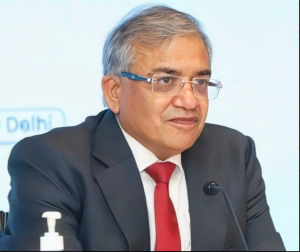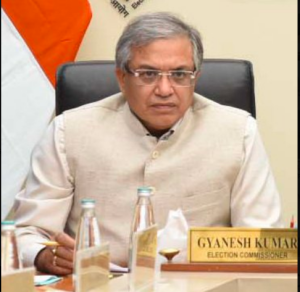Gyanesh Kumar Biography: The 26th Chief Election Commissioner of India
Today let’s talk about Gyanesh Kumar Biography: Gyanesh Kumar is a seasoned Indian bureaucrat and the current 26th Chief Election Commissioner (CEC) of India, assuming office on 19 February 2025. A retired officer of the prestigious Indian Administrative Service (IAS) from the 1988 Kerala cadre, he has built a distinguished career spanning over three decades in public administration. His appointment as CEC comes at a crucial juncture in India’s democratic journey, where electoral integrity, transparency, and trust are being debated more vigorously than ever.
Gyanesh Kumar Biography
Gyanesh Kumar Early Life and Education
Gyanesh Kumar was born on 27 January 1964 in Agra, Uttar Pradesh. From a young age, he displayed an aptitude for academics and leadership. His strong foundation in technical education began at one of India’s premier engineering institutions: He completed his Bachelor of Technology (B.Tech) from the Indian Institute of Technology (IIT) Kanpur. His time at IIT Kanpur gave him not only a robust technical background but also a broader worldview, which later played a critical role in shaping his policy-driven and reform-oriented administrative approach.
Gyanesh Kumar Entry into the Indian Administrative Service
In 1988, Gyanesh Kumar joined the IAS, being allotted to the Kerala cadre. As an IAS officer, he served in a wide variety of roles, showcasing both versatility and commitment to governance. The Kerala cadre exposed him to grassroots administration, people-centric policy execution, and the complexities of governance in a state known for its high literacy, vibrant politics, and unique social dynamics.

Gyanesh Kumar Career in Administration
Over more than three decades in service, Gyanesh Kumar held significant roles in multiple ministries and departments. His postings reflect his adaptability and capability in handling sensitive and diverse areas of governance:
Joint Secretary, Ministry of Defence (2007 to 2012). In this role, he was involved in defence production and strategic affairs, contributing to India’s defence modernization. This position required him to balance industrial growth with national security priorities.
–Parliamentary Affairs Secretary (May 2021 to May 2022)
Here, he facilitated the coordination between the government and Parliament. His work revolved around ensuring smooth functioning of legislative business and supporting parliamentary procedures.
–Secretary, Ministry of Cooperation (May 2022 to January 2024)
This was one of his most high-profile assignments. The Ministry of Cooperation, created in 2021, was tasked with strengthening India’s cooperative movement, especially in agriculture, rural development, and community-based industries. As its secretary, Gyanesh Kumar helped set the foundation for cooperative-sector reforms.
Gyanesh Kumar Biography Other Roles: Beyond these, he held positions in state and central governments, gaining experience in economic development, defence, agriculture, and governance reforms.
Gyanesh Kumar Entry into the Election Commission of India
On 14 March 2024, Gyanesh Kumar was appointed as an Election Commissioner of India. His entry into the Election Commission marked the beginning of his direct involvement in overseeing one of the world’s largest democratic processes. During this tenure, he worked alongside then CEC Rajiv Kumar and fellow Election Commissioners to conduct free and fair elections across India.
Gyanesh Kumar Appointment as the 26th Chief Election Commissioner
With the retirement of Rajiv Kumar in February 2025, Gyanesh Kumar was elevated to the position of Chief Election Commissioner of India on 19 February 2025. His appointment was historically significant because: He became the first CEC appointed under the Chief Election Commissioner and Other Election Commissioners (Appointment, Conditions of Service and Term of Office) Act, 2023.
This law changed the composition of the selection committee, reducing the role of the judiciary and increasing the role of the executive in appointments. His appointment was approved by a panel chaired by Prime Minister Narendra Modi, with the Home Minister, Law Minister, and the Leader of Opposition in the Lok Sabha as members.
Gyanesh Kumar Tenure and Challenges
Gyanesh Kumar is expected to serve as CEC until 26 January 2029, giving him a full four-year term to oversee elections, including the 2029 Lok Sabha elections. His tenure has already faced significant challenges:
“Vote Chori” Controversy: In mid-2025, Congress leader Rahul Gandhi accused the Election Commission of irregularities in voter rolls and data manipulation, calling it “vote theft.”
yanesh Kumar strongly rejected the allegations, demanding either a sworn affidavit with proof or a public apology. He emphasized the transparency of the voter roll revision process, defending the Commission’s integrity.
Political Tensions: Following his firm stance, opposition parties considered initiating impeachment proceedings against him, sparking one of the most high-profile confrontations between a sitting CEC and political leadership.
These controversies highlight the increasing polarization around electoral institutions in India and place Gyanesh Kumar at the heart of defending democratic credibility.
Gyanesh Kumar Personal Traits and Work Ethic
Colleagues and peers often describe Gyanesh Kumar as: Firm but Fair: He is known for taking strong decisions, even if controversial. Technically Sound: With an IIT background, he brings analytical precision to policy execution. Dedicated to Integrity: His rebuttals against unverified political accusations show his commitment to upholding the Constitution.

Gyanesh Kumar Legacy and Significance
As the head of the Election Commission of India (ECI), Gyanesh Kumar carries the responsibility of safeguarding the world’s largest democracy. His appointment during a politically charged era, under a new legal framework, positions him at a historic crossroads. If he manages to maintain the autonomy and credibility of the Election Commission, he will be remembered as a reformer who upheld democratic values under pressure. However, if controversies escalate, his tenure could become one of the most debated in the institution’s history.
Conclusion
Gyanesh Kumar’s journey from a small-town student in Agra to an IIT graduate, then a high-ranking IAS officer, and finally the 26th Chief Election Commissioner of India is a story of dedication, service, and responsibility. His leadership comes at a time when India’s electoral system is under both internal and external scrutiny. As he continues his term until 2029, all eyes will be on how he navigates political pressures, legal reforms, and the monumental task of conducting free and fair elections for the world’s largest democracy.
FAQ
Who is Gyanesh Kumar?
Gyanesh Kumar is a retired Indian Administrative Service (IAS) officer of the 1988 Kerala cadre and the 26th Chief Election Commissioner of India, appointed on 19 February 2025.
When and where was Gyanesh Kumar born?
He was born on 27 January 1964 in Agra, Uttar Pradesh, India.
What is Gyanesh Kumar’s educational background?
He completed his B.Tech from IIT Kanpur, one of India’s premier engineering institutions
When did he join the Indian Administrative Service (IAS)?
Gyanesh Kumar joined the IAS in 1988, belonging to the Kerala cadre.
What positions did Gyanesh Kumar hold before becoming Chief Election Commissioner?
Before becoming CEC, he held several key positions, including: Joint Secretary, Ministry of Defence (2007–2012). Parliamentary Affairs Secretary (2021–2022). Cooperation Secretary (2022–2024)
When did Gyanesh Kumar join the Election Commission of India?
He was appointed as an Election Commissioner on 14 March 2024.
When did Gyanesh Kumar become the Chief Election Commissioner (CEC)?
He became the 26th Chief Election Commissioner of India on 19 February 2025, succeeding Rajiv Kumar.
What is unique about his appointment as CEC?
Gyanesh Kumar is the first CEC appointed under the 2023 Chief Election Commissioner and Other Election Commissioners Appointment Act, which changed the selection process by excluding the Chief Justice of India from the committee.
Why was Gyanesh Kumar in the news recently?
In 2025, he was in the spotlight due to the “vote chori” controversy, after Congress leader Rahul Gandhi accused the Election Commission of irregularities in voter rolls. Gyanesh Kumar firmly rejected the allegations and demanded proof or an apology.
Can the Chief Election Commissioner be removed from office?
Yes. The CEC can only be removed through impeachment by Parliament, similar to the process for removing a Supreme Court judge.
What are Gyanesh Kumar’s notable traits as an administrator?
He is known for being firm, fair, technically sound, and strongly committed to the integrity of the Constitution.
